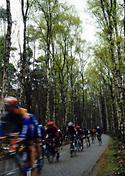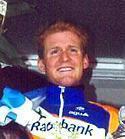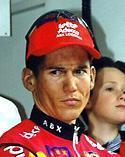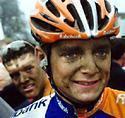
Recently on Cyclingnews.com |
Tales from the Peloton
Veenendaal-Veenendaal: Surviving in the shadow of Flèche and Liège
Buried in the thick of the Northern Classics season is a race with an strong list of past winners that doesn't get quite the attention of its more famous Belgian and Dutch counterparts. But Veenendaal-Veenendaal is a race with big ambitions, as Hugo Gladstone found out.
 |
Central Holland's Veenendaal-Veenendaal is a race with an impressive list of past winners. Across its eighteen-year history riders such as Joop Zoetemelk, Jean-Paul van Poppel, Olaf Ludwig, Viatcheslav Ekimov, Andrei Tchmil and Jeroen Blijlevens have all taken top honours.
Yet despite this record, it is also a race with a serious problem: it's the filling in an Ardennes sandwich. It falls on a Thursday, the day after Flèche-Wallonne and a few days before Liège-Bastogne-Liège. As a result the organisers have struggled to attract what they consider a worthy field.
"It's a difficulty that we've felt over the last three or four years," explained race chairman Jan IJspeert. "Five years ago, riders were riding maybe 100 or 120 races a year but nowadays they're down to 70 or 75. Teams used to ride Flèche, Veenendaal and Liège but now they are resting more and naturally choose those two big events over Veenendaal-Veenendaal."
This problem has had an obvious effect on the race, with the roll call of recent victors proving less illustrious than the race had come to expect. "We have a very famous list of winners but if I'm honest - and with all due respect to the riders concerned - the winners from 1999 onwards have not been of the same calibre as Ekimov, Tchmil or Zoetemelk," said IJspeert.
 |
Dutch riders have dominated the race for the last four years, and although last year's victor was Rabobank's up and coming Bobbie Traksel, IJspeert admitted that he would have preferred third placed Robbie McEwen to have won the sprint. "After four years of Dutch winners I think it's very important that we have a well-known star to take publicity across borders. This year my preferred winner would be either McEwen or Tom Steels."
The chairman also feels that the problem in attracting top riders has been compounded by traffic congestion in the Netherlands. "It used to be that you could travel from Liège (where the teams stay during this period) to Veenendaal in two or two and a half hours. Now it takes at least an hour longer and that puts teams off coming. We've secured a good budget to pay starting fees but we still can't attract the squads."
Appropriately enough, when I spoke to Jan IJspeert he was on his cell phone headset making his way across the Dutch motorway network through dense Good Friday traffic. I made the journey north from Liège last year and also found myself hindered. A snarl up around Eindhoven proved to be the trouble then.
Even more problematic was the lack of exposure in the media. At a service station newsstand I had sifted through the Dutch sports pages to find column inch after column inch devoted to the previous day's Flèche Wallonne in Belgium. There was also a Michael Boogerd diary, a Lance Armstrong story and even news from the Tour of Trentino, but nowhere could I find a preview of the Netherlands' number two race. I was, to say the least, somewhat surprised. An event that I'd been exposed to in the mid 1990's through Eurosport in Britain and national TV in France was no longer catching the imagination of its own country's press. If it weren't for a fleeting mention in the fixtures section ("Today: Cycling: Veenendaal-Veenendaal, at Veenendaal") I'd have turned back to Liège.
 |
The obvious solution to Veenendaal-Veenendaal's problems would be to instigate a date change. This year's revision of the spring campaign should have provided the perfect opportunity. As Flèche-Wallonne and Liège-Bastogne-Liège swapped dates with Amstel Gold, Veenendaal-Veenendaal could have stayed put and landed itself in a slightly less intense week. "That's what we wanted to do," revealed IJspeert, "but the UCI wouldn't let us. We've moved with Flèche and Liège, although our race is more suited to the kind of field that competes in the Scheldeprijs and Amstel Gold."
"Ideally we'd prefer a weekend date," he went on, "and last year we made a proposal for the first Saturday in May. We got a negative response from the UCI with no other suggestions or options. We are the second biggest one-day event in the Netherlands and we need to take steps forward and close that gulf between ourselves and Amstel Gold. With a weekend date we would be certain of live TV coverage and hence the upward spiral of exposure, sponsorship and a good quality field."
Other options for enhancing the race include making the route tougher or getting a larger city like nearby Arnhem to host the start. Based along the banks of the Neder Rijn and through the crazily winding roads of the Veluwezoom National Park the parcours is both spectator friendly and charismatic as it stands. But a new start could bring in more money.
"Almost 85 percent of our funding comes from Veenendaal itself, which is a town of just sixty thousand residents. If we made a stronger connection with a city like Arnhem then there is potential for much more sponsorship," explained IJspeert. "We could also revise the course to make it more selective."
 |
Another option would be to climb the UCI event ladder so more all-important UCI points would become available to competitors. Veenendaal-Veenendaal is currently ranked as a 1.2 event; the organisers would ideally like to shift up to at least 1.1 status which would put it on a par with events like Het Volk, Grand Prix des Nations and Milan-Turin. However the UCI only allow 15 such races a year and all allocated slots are filled. "It seems strange to me that a nation like Holland - a country with quite something of a cycling history - can have just one World Cup race and no 1.1 race," remarked IJspeert. "I think there should be at least one 1.1 race in the Netherlands and frankly that should be ours. Unless either the UCI increase the quota or another 1.1 event folds, I can't see that happening though."
But Veenendaal-Veenendaal has always had a proactive approach to solving problems. It was founded on the back of an early eighties recession that saw the closure of several cigar and wool manufacturing plants in the Veenendaal area. The race was devised as a window to present the ailing town as an attractive and sporting community. Its first year was a roaring success with Dutch hero and 1980 Tour de France winner Joop Zoetemelk topping the podium and bringing widespread exposure to the event. In 2001 the race was put in jeopardy by the outbreak of foot and mouth disease. While almost everything else affected was cancelled with the drop of a hat, Veenendaal-Veenendaal quite simply rerouted through less sensitive areas.
 |
It seems unlikely that the current difficulties facing Veenendaal-Veenendaal are going to stand in its way for too long. "We'll find ways round our problems," said IJspeert. "As from next year we'll make new steps forward. We will bring new concepts to the race and refuse to be scheduled in the same slot."
So this Thursday as you wallow in the analysis from Flèche-Wallonne and indulge in the hype of Liège-Bastogne-Liège, remember the race up north. It's an event on the rise and if Mr IJspeert gets his way, it'll have a big name winner.
